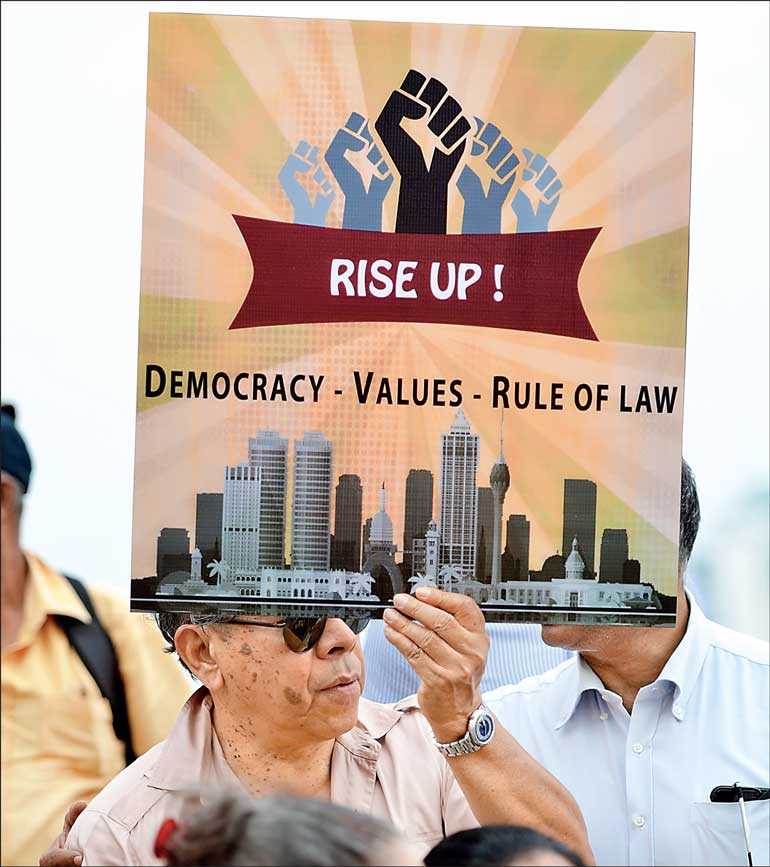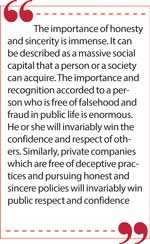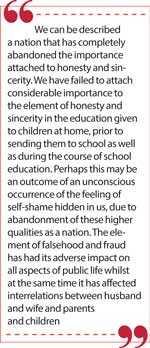Monday Jan 19, 2026
Monday Jan 19, 2026
Friday, 12 July 2019 00:00 - - {{hitsCtrl.values.hits}}

Sri Lanka can be considered one of the most beautiful countries in the world. Yet, the society and political ambience of this beautiful country are in a deplorable level, which is extremely ugly and comical. While there are many reasons which have led to this situation, I intend to talk about one important factor which has not been  sufficiently discussed.
sufficiently discussed.
The destruction of honesty and sincerity, which can be considered the most important elements that should form the essence of the stream of blood that flows through the veins of the body politics of Sri Lanka, giving way to falsehood and fraud to take their place, can be considered one of the most important factors effecting the great disaster the country is facing today.
It can be seen that falsehood and fraud have become distinct elements in all things operative in Sri Lanka. All the rulers who steered the political power of the country since independence have acted on the assertion that the people of Sri Lanka can be and must be deceived to a certain extent. Even in instances where people have realised that they have been deceived by their rulers, they seem to have not become frustrated or angry over the rulers who deceived them. Strangely, the people tend to take it as a normal thing which shouldn’t be taken as a serious issue.
This trait is relevant even to the clergy. The clergy too live on a policy that deceives their devotees. This characteristic is equally true for large and small scale producers as well as traders and retailers.
The values lost by deceptive practices
Sri Lanka had a very high reputation for producing the finest quality tea in the world. Yet, Sri Lanka has lost this recognition as it failed to maintain the desired quality standard of tea following the ownership of the tea industry being transferred to the locals.
Recently it was revealed that factory owners have adopted a policy of adding sugar to tea as a means of maximising profits earned from tea. Following the crisis that arose in the tea market, though it was possible to catch a considerable number of factory owners who had adulterated the quality of tea by adding sugar to tea, no measures have been taken to implement the law against the defaulters.
Sri Lanka is the home of the best quality cinnamon in the world. Though there are many other countries where cinnamon is grown, it was “Ceylon Cinnamon” which is native to Sri Lanka that was acknowledged as the best cinnamon in the world.
Unfortunately, Sri Lanka didn’t know how to market it as a value-added product to generate an optimum income except for selling the product to countries which produce low quality cinnamon, giving them an opportunity to mix our cinnamon with their low quality products and sell them in the international market. 
Before tea was introduced as an export crop, cinnamon occupied the main export crop during the rule of the Portuguese and the Dutch. There was a specific cinnamon peeler caste known in Sinhalese as Salagama. Sri Lanka was important for both the Portuguese and the Dutch because of cinnamon.
We have damaged the reputation and confidence Ceylon Cinnamon” enjoyed in the world market due to mixing of the product with inferior quality cinnamon. Besides, we earn only a negligible income of the actual value that could be generated from the sale of cinnamon.
Kithul treacle or pani
Kithul treacle and jaggery are other products that have good potential to be developed as a rural industry. Compared to other sweeteners like golden syrup, if the thickness of kithul treacle could be enhanced while preserving its quality, certainly, it can be developed into a valuable export product that would generate a considerable income.
I have discussed this possibility at length with late Lalith Athulathmudali and Chandra Schaffter, the founder of the Sri Lanka’s first major Sri Lankan-owned insurance company, Janashakthi. Schaffter, having explored the export market for kithul treacle, informed me that it would be possible to sell it in Japan, but he was not prepared to initiate it as there was a problem in procuring adequate stocks of high quality kithul treacle to meet the export demand.
It is important for the production of kithul toddy to be allowed, if kithul treacle and jaggery are to be developed as a rural industry. Kithul toddy is an alcoholic beverage, consumption of which is more comparatively beneficial than consuming kasippu. Perhaps it can be a profitable venture to have kithul grown as large-scale estate cultivation, considering its various uses.
The extent of falsehood and fraud rooted in the life of people can be realised from the production of kithul treacle as well. It is extremely difficult to find an undiluted bottle of kithul treacle. Kithulgala is an area famous for kithul treacle. There are exclusive shops selling kithul treacle and jaggery there. But none of these shops have genuine and undiluted treacle for sale.
Though there is a big demand for genuine and undiluted kithul treacle in the domestic market, even the products sold in the market for a higher price claiming to be of genuine products are in fact not of excellent quality.
Tourism industry
Sri Lanka has great potential to be made a paradise of foreign tourists. Yet, tourism in Sri Lanka can be described as a business overwhelmed by falsehood and fraud. The widespread belief that there is nothing wrong in exploiting foreign tourists can be considered an attitude that is deeply rooted in the entire industry.
Most of the tourists who have visited Sri Lanka in the past, particularly during the early 30 years in which Sri Lanka placed a greater emphasis on tourism, came from European countries, which had a high level of per capita income. The per capita expenditure incurred by them during their sojourn in Sri Lanka remained high. But Sri Lanka was unable to sustain this segment of market in the tourism industry.
Certain European tourists who used to visit Sri Lanka had developed close friendships with locals and initiated business partnerships with them. More often than not, the entirety of capital requirements of such businesses had been borne by the European partners themselves while the local partners were expected only to participate nominally in the management of the ventures initiated by them on profit sharing basis.
Yet, most of those transactions had eventually ended up with the entire investment of foreign partner being acquired by the local partner, craftily and brazenly. The local partners were not easily satisfied with the income they received from free share of business which they had been offered without having to make any capital investment of their own.
Sri Lanka has failed to ensure a relatively better service for foreign tourists compared to the fees charged from them. The fees payable by foreign tourists to visit places of historical importance remain at a maximum level while the facilities available for their convenience are deplorably low. 
In constructing tourist hotels, prominence is given for building expensive concrete structures. Similarly, prominence is given to the cuisine which they are accustomed to in their own countries rather than offering them more local food items. The ripe banana can be cited as a good example in this connection. They are familiar with only one or two popular varieties of banana when Sri Lanka has got a wide and varied range of bananas. If the tourist hotels offer their foreign guests all varieties of banana available in the country, it would certainly help them realise and distinguish the different tastes of each variety and select some of them for their consumption.
If the tourism industry is to be improved, it is important that the soul of the tourism industry should be changed, giving it a new facelift. The present image of deception and exploitation attached to the tourism industry must be changed and it should be converted into an industry that provides a good service for the fees charged from the foreign tourists, thereby winning their respect and trust.
Education
Even education in Sri Lanka can be considered a system based, to a great extent, on falsehood and fraud. It is an extremely uncivilised system which has compelled the parents to contemplate the school into which their child should be sent, when he reaches the school-going age, from the moment he or she is conceived and to get ready with the preparation of false documents to prove the qualifications required, if the child is to be admitted to a popular school.
This is an uncivilised system, thrusting people into falsehood and fraudulent practices, a system not to be found in any other country in the world. The school system too has been classified in a manner that the children of rich people will receive good schools while those of the poor will end up in schools perceived to be useless and having no adequate facilities.
In most cases, the majority of parents desiring a good school for their children are compelled to cook up documents to satisfy the selection criteria, incurring a very high cost, in addition to being forced to pay a handsome sum of money, directly or indirectly, to the school into which the child was admitted.
The extent of deceptive practice adopted by the education authorities in respect of the subject of mathematics is also enormous. Over a considerable period of time, the rate of students who failed mathematics at the GCE O/L examination remained as high as 65%. All of a sudden, the situation was reversed with the rate of failures coming down to 35% and that of passes going up to 65%.
This sudden progress was not an outcome of a gradual progress in the competency of the subject knowledge of the students, nor was it due to an improvement in teaching techniques. It was only an outcome of lowering the level of pass marks to as low as 29. Isn’t this a dangerous game being played with the future of the younger generation?
The teaching methodology adopted from Grade 1 up to the University level has been based on rote learning, memorisation technique based on repetition. Memorisation was practiced in the long past when there were no written languages. This arduous system of education was then known as ‘vanapothkireema’ or to learn by rote or committing to memory. Today we are living in a developed world. Yet, the education of Sri Lanka is being pursued on rote learning. This, no doubt, is a system that distorts and kills the creative abilities of children.
The backwardness of the education system in Sri Lanka is an important factor that has affected the degeneration of the country. The ethnic, caste and religious divisions and backward attitudes that prevail in Sri Lankan society can be considered as an outcome of the futility of the system of education. The failure that reigns in the political arena can also be considered a consequence of this situation.
Abandonment of honesty
We can be described a nation that has completely abandoned the importance attached to honesty and sincerity. We have failed to attach considerable importance to the element of honesty and sincerity in the education given to children at home, prior to sending them to school as well as during the course of school education.
Perhaps this may be an outcome of an unconscious occurrence of the feeling of self-shame hidden in us, due to abandonment of these higher qualities as a nation. The element of falsehood and fraud has had its adverse impact on all aspects of public life whilst at the same time it has affected interrelations between husband and wife and parents and children.
The importance of honesty and sincerity is immense. It can be described as a massive social capital that a person or a society can acquire. The importance and recognition accorded to a person who is free of falsehood and fraud in public life is enormous. He or she will invariably win the confidence and respect of others. Similarly, private companies which are free of deceptive practices and pursuing honest and sincere policies will invariably win public respect and confidence.
The water pump produced by Jinasena & Company is one of the best examples that can be cited in this connection. I have been using a Jinasena water pump at my residence. It is more than 30 years old. This company may have earned profits from the production of water pumps. Yet, it has produced a durable product with a long-term existence. Evidently, the honesty and sincerity of the founder of this water pump had impacted on the quality of the products manufactured by this company. This unique characteristic of the company might have affected the progress of the company as well as consumer confidence in the company.
Professionals
It can be said that all professionals, irrespective of their field of expertise, have lost the professional pride attached to the profession. It is as if there isn’t a single profession which has preserved public confidence and respect.
There is no accepted norm as far as professional fees are concerned. This has enabled professionals to act arbitrarily and as they wish. In certain fields, the fees they charge are unbelievably high. There is a widespread complaint that the service rendered by many professionals is not to the standard expected of their profession notwithstanding the exorbitant rates being charged.
There is no proper legal system in operation to safeguard public interest and investigate into malpractices and injustices caused to clients by professionals and to act on their complaints. Some professions have got self-regulatory systems, but they are either slow or dormant in enforcing and monitoring compliance with standards. Apparently many of the self-regulatory authorities do not like to initiate a strict policy against their professional colleagues.
Despite this being the general situation of professionals of Sri Lanka, I must mention that there is at least a small segment of professionals who discharge their duties and responsibilities properly while maintaining the pride of their profession.
The entire institutional system of the country is in a situation in which it has lost the confidence and respect of the people. The falsehood and fraud that has overwhelmed the entire public life too has caused this situation. There is no way that professional pride and public respect can be restored externally on those who have already lost these qualities. It can only be restored internally and by themselves alone by adhering to the ethical standards demanded by their professions. It would only be possible by shedding falsehood and fraud and adopting a policy and practice based on honesty and sincerity.
A system could be adopted to issue licenses or official certification needed to practice a particular profession in respect of all professionals, within the framework of a structural reform made for the country. Along with that, a proper and formal policy could be introduced with regard to the fees charged from the clients. Also, a system of inquiry and implementation of law against those committing errors which can be considered professional offences in dealing with their clients can also be introduced.
The license issued for professional practice should be renewed from time to time, and it would be possible to take into account the new knowledge he or she had acquired during the interim period as well as the offences committed, if any, when renewing the license. The system of issuing license can be tied up with an insurance system and a method can be introduced to pay compensation to the client, by the insurance company, in the event of damage caused by professionals to the client. As the professionals committing frequent mistakes will be compelled to pay a high insurance premium, this system may serve as an indirect deterrent to their irresponsible behaviour.